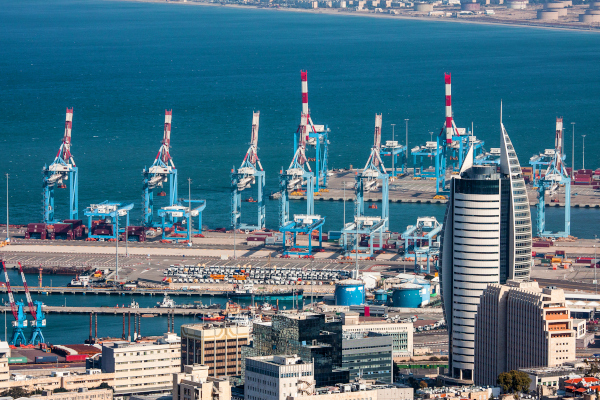The Impacts of the Israel-Hamas Conflict on Global Trade
Shipping bottlenecks, increased costs, and disrupted deliveries could result in shifting transportation of goods from the affected region
The ongoing Israel-Palestine conflict is sending ripples through the shipping and maritime industry, leading international companies to issue cautionary advisories and adapt their operations in the region.
The long-term effects of this ongoing dispute could lead to bottlenecks in shipping, increased freight rates, and unpredictable delivery schedules—all of which are likely to significantly increase the cost of doing business in this region. Not only will businesses incur additional costs related to rerouting shipments, but they must also increase security measures during this period of conflict. Increased supply chain costs can also be associated with finding alternative shipping routes and even identifying new suppliers in another part of the world.
Transportation and logistics to face biggest disruption
In addition to increased costs, the conflict is likely to lead to an overall shift in the transportation of goods. Potential risks include damage to infrastructure, port closures, and a diversion of transportation from the region’s largest shipping hubs.
“Any expansion of the hostilities beyond the country’s borders could introduce risks to two vital shipping choke points,” says Christian Roeloffs, cofounder and CEO, Container xChange. “The Suez Canal, a critical waterway for various commercial vessels, including container ships, may face disruptions. Similarly, the Strait of Hormuz, a backbone for oil and gas shipping, could be affected. However, the extent of these effects will largely depend on the conflict's expansion and duration.”
“The Suez Canal, a critical waterway for various commercial vessels, including container ships, may face disruptions. Similarly, the Strait of Hormuz, a backbone for oil and gas shipping, could be affected. However, the extent of these effects will largely depend on the conflict's expansion and duration.”
If these waterways are affected, vessels would be forced to take the longer route around Africa, leading to reduced vessel capacity and increased shipping rates. It’s worth noting, however, that Israel represents a relatively small market for container shipping, with its primary ports of Ashdod and Haifa accounting for just 0.4% of global throughput. Consequently, the threat of disruptions to container trade flow through the Mediterranean region remains limited.
Geopolitical uncertainty requires resilient supply chains
Maersk, a major player in the industry, reassured stakeholders by announcing that its port operations across Israel’s key terminals are functioning without disruption. MSC echoed this sentiment, asserting that Israel’s major terminals are operational, enabling them to facilitate cargo delivery.
The region’s largest ports so far have also been able to operate as normal. The Port of Haifa, encompassing the Haifa Bay port and Israel shipyard, the Port of Hadera, and the Port of Eilat all carry on with disruption.
In contrast, the Port of Ashdod, situated about 30 miles from the Gaza border, is operating in an emergency mode, subject to potential missile attacks, with restrictions on vessels carrying hazardous materials. The Port of Ashkelon, located less than 10 miles from the Gaza border, is even more severely impacted, rendering it incapable of normal operations due to missile threats. Vessels can only discharge cargo while moored at sea buoys.
“In light of recent developments in the Middle East, including the outbreak of war in Israel and its vulnerability to missile attacks and the incursion of opposing militias, the security of transporting goods through the port of Haifa has become uncertain,” says Hossein Norouz Fashkhami, a senior marketing expert from Middle East. “The transit of containers, especially hazardous materials, and the arrival of commercial vessels greatly emphasize the importance of security on this route. Such insecurity or potential terrorist attacks could lead to a shift in the transportation of goods.”
Article Topics
Container xChange News & Resources
Tech Investment, Addressing Overcapacity Among 2024 Focus for Global Container Shipper Industry The Impacts of the Israel-Hamas Conflict on Global Trade US Container Traffic Boosted by Back-to-School Rush Panama Canal Backlog Threatens Holiday Inventories 2023 State of Logistics: Ocean cargo Ocean shipping returns to pre-pandemic status Ocean Cargo: Stormy seas ahead for carriers More Container xChangeLatest in Transportation
City of Baltimore Files Lawsuit to Recoup Money for Collapsed Bridge The Era of Self-Driving Tractor-Trailers Set to Begin Is the Trailers as a Service (TaaS) Model Right For Your Business? Why Grocery Shoppers are Leaving Stores to Buy Their Food Online Unlocking Efficiency: Navigating Sea Freight Logistics in Supply Chain Management Is There a Next Generation of Truckers? Data Reveals Grim Outlook A Look at Baltimore’s Key Bridge Collapse—One Month Later More TransportationAbout the Author












